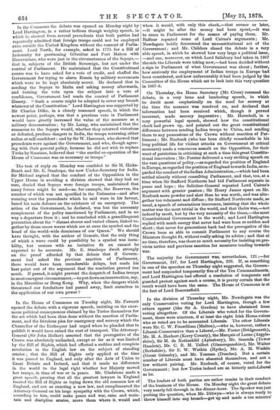In the House of Commons on Tuesday night, Mr. Fawcett
opened the debate with a vigorous speech, insisting on the enor- mous political consequences claimed by the Tories themselves for the act which had been thus done without the sanction of Parlia- ment, and the frivolous plea for emergency and secrecy which the Chancellor of the Exchequer had urged when he pleaded that to publish it would have raised the cost of transport. The Attorney- General (Sir John Holker) asserted that the prerogative of the Crown was absolutely unlimited, except so far as it was limited by the Bill of Rights, which had effected a sudden and complete revolution in the English law on the subject of standing armies ; that the Bill of Rights only applied at the time it was passed to England, and only after the Acta of Union to Great Britain and Ireland, and that it made no difference in the world to the legal right whether her Majesty moved her troops, in time of war or in peace. Mr. Gladstone made a great speech, proving that all the greatest lawyers in England treated the Bill of Rights as laying down the old common law of England, and not as enacting a new law, and complimented the Attorney-General on his large sympathy with the Crown, which, according to him, could make peace and war, raise and main- tain and discipline armies, move them where it. would and when it would, with only this check,—that sooner or later, —it might be after the money had been spent,—it was to come to Parliament for the means of paying them. Mr. Balfour repeated some of Lord Cairns's arguments ; Mr. Newdegate boldly denounced the unconstitutional act of the Government; and Mr. Childers closed the debate in a very able speech, in which he showed how very large a political issue, —and one, moreover, on which Lord Salisbury had taken in 1867 the side the Liberals were taking now,—had been decided without a sign to Parliament of what Government was about ; further, how anxiously the employment of Indian troops in Europe had been considered, and how unfavourably it had been judged by the Committee of the House which sat to look into this very question in 1867-8.


































 Previous page
Previous page